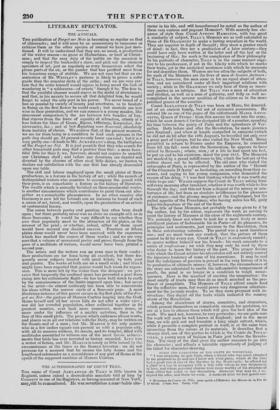THE ANNUALS.
LITERARY SPECTATOR.
THE publication of Forget me Note is becoming as regular as that of almanacks ; and it will soon be as unnecessary to announce or criticise. them as the other species of annual we have just men- tioned. It will be understood that they are, as usual, a production of the winter season—as geese at Michaelmas, or beef at Christ- mas ; and that the easy duty of the 'public on the occasion is simply to inspect the bookseller's show, and pick out the choicest specimen of art, just as regularly as wary housewives select the prime parts of the ox, or the gander that has profited most from his luxurious range of stubble. We are not sure but that an ex- amination of Mr. WESTLEV'S parterre is likely to prove a safer guide than the oracular dicta of the critic ; and we are very cer- tain that the critic himself would rejoice in being saved the task of wandering in " a wilderness—of sweets" though it be. The fear is, that the youthful chooser would starve in the midst of abundance ; and that, in his anxiety to secure all that delighted him, he would forget to select the only part in his power. We never heard of a bee so puzzled by variety of beauty and sweetness, as to hesitate in fixing on the first flower he could reach ; but mortals are less wise in their generation, and we can conceive a young maiden, like (irreverent comparison!) the ass between two bundles of hay, that starves from the force of equality of attraction, utterly at a loss before the blaze of Gems, Bijous, Offerings, Keepsakes, An- niversaries, &c. ; and at last departing sans Souremr, absolutely from inability of choice. We confess that, at the present moment, we are far from being in a condition to lead such persons in the path they should go. At present we only know one road ; but it is a very pretty one—it leads to Mr. AcxERMANN's shop, the birthplace of the Forget me Not. It is just possible that they Who search for other household gods may find a prettier than this : a more beau- tiful little lar than it, we, however, should not require to sanctify our Christmas shelf; and before our devotions are dazzled and diverted by the charms of other rival little deities, we hasten to declare our satisfaction with the one that has already descended upon our table.
The skill and labour employed upon the small plates of these productions, is a feature in the history of art ; while the crowds of distinguished writers who combine to accompany the pencil with their pens, is as remarkable a feature in the history of literature. The wealth which is annually lavished on these ornamental works, is another circumstance which contributes to point them out alto- gether as a remarkable phenomenon. In no other country (for Germany is now left far behind) can an instance be found of such a union of art, talent, and wealth, upon the production of an article of sentimental luxury. The union between poetry and painting has often been dwelt upon; • but there probably never was so close an example of it as in these Souvenirs. It would be very difficult to say whether they owe their popularity most to the attraction of the plates, or the interest of the print ; or whether, indeed, either of them apart would have secured any decided success. Fourteen or fifteen plates alone would never have been received with the eagerness which has marked the course of these works ; and we are very sure that a volume of occasional poetry and prose, though from the pens of a multitude of writers, would never have been printed a second year.
The artists and the writers run an even race in their works : their productions are far from being all excellent, but there fre- quently occur subjects treated with great felicity by both poet and painter. The works of both are on a small scale ; and thus it might have been expected that genius would lack room for expan- sion. This is more felt by the writer than the designer: we per- ceive that frequently the confined space has prevented a poet from rising into his enthusiastic flight—he has been held down to earth by the consciousness of the limit's imposed upon him ; but never so the artist—he almost uniformly has been able to concentrate his ideas within the narrow circle of a Souvenir page. A most illustrious instance of this power occurs in the first plate of the For- get me me Not—the picture of Marcus Curtius leaping into the Gulf. Rome herself and all her seven hills do not offer a wider view ; nor did her crowded population, when collected together in its greatest number, ever look more numerous, more dense, or more under the influence of a mighty agitation, than in the face of this small plate. The prayer which embraces all our wants, and places us in all our relations with the Deity, may be written on the thumb-nail of a man ; but Mr. MARTIN is the only painter who in a few inches square can present us with a populous city, with all its massive edifices, its streets, and its temples, filled with multitudes assembled to witness one of the most heroic achieve- ments that fable has ever invented or history recorded. LIVY was a writer of fiction, and Mr. MARTIN is surely as little bound by the circumstances of the times as the Roman historian : we do not presume for a moment that he means the lofty domes and the lengthened colonnades as a resemblance of any part of Rome at the epoch of the supposed sacrifice of Marcus Curtius.


















 Previous page
Previous page